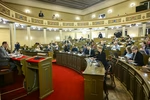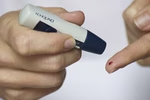
The past year in the healthcare sector will be remembered for a corruption scandal related to the procurement of overpriced medical equipment, which led to the dismissal of Minister Vili Beros, whose portfolio was taken over by State Secretary Irena Hrstic, who promised to restore public confidence in the healthcare system.
In early 2024, former Minister Beros announced plans to centralise 85% of public procurement with the aim of achieving significant savings of 5%. However, by the end of the year, he was under investigation for manipulation and favouritism in the awarding of contracts, with some equipment allegedly overpriced by up to 200%.
"An act of personal betrayal"
In addition to Beros, prominent Zagreb neurosurgeon Kresimir Rotim, the director of the Zagreb Children's Hospital Goran Roic and Serbian entrepreneur Sasa Pozder were also arrested in the major corruption scandal in November. The controversial businessman Hrvoje Petrac and his sons Nikola and Novica Petrac were also implicated.
This happened in a year in which Prime Minister Andrej Plenkovic had reaffirmed his confidence in Beros as head of the healthcare system in his third government. Just a few months after the formation of the new government, the Prime Minister expressed his outrage and described the allegations against Beros, if proven true, as a personal betrayal.
Beros was released from Remetinec prison at the end of November and is now awaiting further investigation. State Secretary Irena Hrstic took over as minister at the beginning of December.
New minister promises to overhaul the procurement system
One of Hrstic's first steps was to announce a review of hospital procurement contracts authorised by the ministry, focusing on equipment purchased at high prices. Under existing regulations, hospital directors could independently procure equipment costing up to €100,000, with approval from the ministry required for higher amounts.
The new minister has prioritised creating a sustainable funding model for the healthcare system and restoring public confidence in the system.
She also promised stricter rules for additional work by doctors, the revitalisation of primary healthcare and the stabilisation of the financial situation of the system, which had a record budget of €6.93 billion this year.
Nevertheless, the total debt owed by hospitals to pharmaceutical wholesalers totalled 677 million euros at the end of October, with overdue debts amounting to 466 million euros. Monthly debt growth averaged 30 million euros.
The healthcare administration estimated that a budget of 8 billion euros is needed to prevent hospitals from making losses. This year, two bailouts totalling 223.3 million euros were carried out to reduce overdue debts older than 120 days.
State takes over county hospitals
Officials also claimed to have reduced hospital waiting lists from 400 days to 146 days. In the middle of the year, contracts were signed with 18 private clinics and facilities to provide 3 million euros for this problem.
Although the service was free for patients and the Croatian Health Insurance Fund (HZZO) paid the private clinics at the same rates as public hospitals, the move was criticised as a "diversion of public funds to private entities".
From 1 January 2024, the state will take control of the county's general hospitals and appoint new boards and directors with the minister's approval.
The counties of Krapina-Zagorje and Medjimurje, together with the City of Zagreb, have filed a constitutional complaint against the provision transferring hospital administration to the state, but the Constitutional Court has not yet made a decision.
Although the state has taken over the administration in order to improve financial operations, hospitals have performed 105% worse in the first half of this year than in the same period last year. The failure to reconcile the increased ceilings for hospitals with the increase in overdue commitments has been cited as a major problem.
Rising costs for energy, consumables and drugs, as well as significant salary increases - between 6% and 35.8% in April - contributed to the problem. Despite this, hospital budgets were still largely eaten up by salaries, reviving calls for realistic budget caps.
The Ministry anticipated that expenditure on salaries alone would exceed €600 million by the end of the year, significantly more than the €250 million originally planned.
End of the "bondage contracts"
This year also saw the abolition of the so-called "bondage contracts" for medical residents. Changes to the law exempted them from paying penalties if they leave their training hospitals before completing their contract. Previously, these penalties could include the salary earned and reach up to €120,000. Residents can now leave the public healthcare system by being reimbursed for training costs up to a maximum of €7,000.
The Croatian Healthcare Employers' Association spoke out against the liberalisation, fearing a mass exodus of doctors from less desirable regions to the big cities, private practises or abroad. As a solution, they proposed centralised specialisations and funding by the state.
Despite the pay rises, a strike was organised by the "Together" union in November, mainly involving laboratory technicians, radiology technicians, nurses and pharmacy assistants. After four days, they obtained a promise that the discrepancies in their salary coefficients would be eliminated. Beros reached an agreement with the strikers one day before his arrest and dismissal.
New public health network and labour shortage
In April, a new public health network was introduced, which increases the capacity of palliative care, integrates speech therapists and psychologists into the health centres and enables two-shift operation in the hospitals.
Professional associations repeatedly pointed out a shortage of 90 gynaecologists, 80 paediatricians and 266 general practitioners in primary healthcare.
On a positive note, there are some encouraging economic indicators in the healthcare sector: 1.75 million employees pay into the health insurance scheme - 300,000 more than five years ago.
Kakvo je tvoje mišljenje o ovome?
Pridruži se raspravi ili pročitaj komentare



 Srbija
Srbija
 Bosna i Hercegovina
Bosna i Hercegovina
 Slovenija
Slovenija



























































